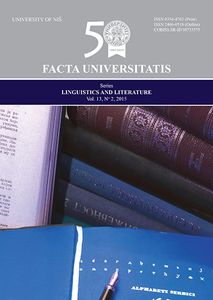ON THE PERCEPTION OF THE SLOVAK VERBS OF THINKING BY SLOVAK MONOLINGUALS AND HUNGARIAN-SLOVAK BILINGUALS
ON THE PERCEPTION OF THE SLOVAK VERBS OF THINKING BY SLOVAK MONOLINGUALS AND HUNGARIAN-SLOVAK BILINGUALS
Author(s): Matúš HrubovčákSubject(s): Finno-Ugrian studies, Western Slavic Languages
Published by: Универзитет у Нишу
Keywords: bilingualism; cognitive semantics; interference; verbs of THINKING
Summary/Abstract: The present paper deals with the semantic field of the Slovak verbs of THINKING from the perspective of cognitive semantics and sociolinguistics. It is hypothesized that the results will prove a hierarchical distribution in the field (i.e. a cline from prototypes to peripheries). This opposes the objectivist position assuming categorial homogeneity, with all members meeting the same criteria. Moreover, sociolinguistically conditioned differences are expected to exist between our two samples. The first one, comprising Slovak monolinguals, will serve as a control group. The other one, consisting of their Hungarian-Slovak bilingual peers, will be checked for the influence of the language background exerted on the perception of the verbs. The results seem to confirm the hypothesized hierarchical distribution and throw some light on the role of the language background in the bilingual sample.
Journal: FACTA UNIVERSITATIS - Linguistics and Literature
- Issue Year: 13/2015
- Issue No: 2
- Page Range: 107-116
- Page Count: 10
- Language: English

